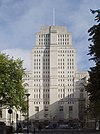Sylvia Walby
Sylvia Walby | |
|---|---|
 | |
| Born | Sylvia Theresa Walby 16 October 1953 |
| Nationality | British |
| Known for | domestic violence, patriarchy, globalisation |
| Spouse(s) | John Urry, deceased |
| Scientific career | |
| Fields | Sociologist, Criminologist |
| Institutions | Royal Holloway, University of London |
| Website | Official website |
Sylvia Theresa Walby OBE FBA FAcSS (born 16 October 1953)[1] is a British sociologist, currently Professor of Criminology at Royal Holloway University of London. She has an Honorary Doctorate from Queen's University Belfast for distinction in sociology.[2] She is noted for work in the fields of the domestic violence, patriarchy, gender relations in the workplace and globalisation.
Walby is coordinator of the Gender Equality Research Network International (GENIe) the aim of which is to develop, through research, the knowledge base to understand and reduce gender inequality.[3] She is principal Investigator of the Lancaster node of Quing, an Integrated Project funded by the European Union under Framework 6 to investigate gender and citizenship in a multicultural context, 2006–2011, Member of the executive board, and Leader of the strand on Intersectionality. She is also co-organiser of an international network on Gender Globalization and Work Transformation (GLOW).
Walby is the first UNESCO Chair in Gender Research and coordinates the associated UNESCO Chair in Gender Research Group. She was appointed in 2008.
Biography
[edit]Walby has been Sociology Professor at the University of Leeds, Professor and Head of Department of Sociology at Bristol University; Reader in Sociology and Director of the Gender Institute at the LSE; Lecturer in Sociology and Director of the Women's Studies Research Centre at Lancaster University; Visiting Associate Professor in Sociology at UCLA and Honorary Visiting Scholar at the Schlesinger Library, Harvard University. She was the first President of the European Sociological Association and has been Chair of the Women's Studies Network UK.
Her current research is situated within the tension between general social theory and specific forms of inequality, especially gender. Over the years this led her from theories of patriarchy to a current concern to mainstream difference into social theory. She has an interest in economic matters, a fascination with new political forms, and concern with marginalised groups. Today, all of these issues are framed by globalisation, the understanding of which requires new forms of social theory, especially complexity theories.
She was appointed Officer of the Order of the British Empire (OBE) in the 2008 Birthday Honours.[4] In 2017 her contribution to sociology was recognised by Queen's University Belfast who awarded her an Honorary Doctorate in Social Sciences (DSSc).[5]
In 2022, she was elected a Fellow of the British Academy (FBA), the United Kingdom's national academy for the humanities and social sciences.[6]
Works
[edit]Social theory, Complexity theory
[edit]
- Walby, Sylvia (2009). Globalization and inequalities: complexity and contested modernities. Los Angeles: Sage. ISBN 9780803985186. A book from a long-term programme of research.
- Walby, Sylvia (April 2004). Complexity theory, globalisation and diversity (PDF). Lancaster: Department of Sociology, Lancaster University. Paper presented to a conference of the British Sociological Association, University of York, April 2004.
- Walby, Sylvia (April 2003). Modernities/globalisation/complexities (PDF). Lancaster: Department of Sociology, Lancaster University. Paper presented to a conference of the British Sociological Association, University of York, April 2003.
- Walby, Sylvia (Winter 2001). "Against epistemological chasms: the science question in feminism revisited". Signs. 26 (2): 485–509. doi:10.1086/495601. JSTOR 3175450. S2CID 143602068. Pdf.
- Response from Sandra Harding (doi: 10.1086/495602).
- Response from Joey Sprague (doi: 10.1086/495603).
Gender, Globalization and Work Transformation
[edit]Walby is co-organiser of an international network on Gender Globalization and Work Transformation (GLOW), with members in US, Japan, Germany and UK. Key interests are in the relationship between the new knowledge based economy and new non-standard employment forms in the context of changing forms of regulation and deregulation and globalisation.
- Walby, Sylvia; Gottfried, Heidi; Gottschall, Karin; Osawa, Mari (2007). Gendering the knowledge economy comparative perspectives. Basingstoke England New York: Palgrave Macmillan. ISBN 9780230575707. Edited with GLOW.
- Walby, Sylvia (October 2002). Gender and the new economy: regulation or deregulation? (PDF). Lancaster: Department of Sociology, Lancaster University. Presented to the Economic and Social Research Council (ESRC) seminar 'Work, life and time in the new economy', LSE October 2002.
- Walby, Sylvia (2001). Gender (in)equality and the future of work (PDF). Transforming work. Manchester, UK: Equal Opportunities Commission. Working paper series no. 55.
Gender-based violence
[edit]Work for the UN on improving statistics and indicators on violence against women:
- Walby, Sylvia (2005). "Improving the statistics on violence against women" (PDF). Statistical Journal of the United Nations Economic Commission for Europe. 22 (4): 193–216. doi:10.3233/SJU-2005-223-402.
- Walby, Sylvia (2006). Developing indicators on violence against women (PDF). Lancaster: Department of Sociology, Lancaster University.
- Walby, Sylvia (June 2006). Towards international standards for data collection and statistics on violence against women (PDF). Geneva: United Nations Economic Commission for Europe (UNECE). Invited paper (ref ECE/CES/GE.30/2006/7) for the UNECE's Conference of European Statisticians, Group of Experts on Gender Statisticians, 11–13 September 2006.
- Member of UN Task Force on Violence Against Women, 2006-.
- Walby, Sylvia; Allen, Jonathan (March 2004). Domestic violence, sexual assault and stalking: Findings from the British Crime Survey (PDF). London: Development and Statistics Directorate, Home Office Research. Home Office research study paper no. 276, based on a consultancy with the Home Office's British Crime Survey.
- Walby, Sylvia (September 2004). The cost of domestic violence (PDF). London: Office for National Statistics funded by the Women & Equality Unit, Department of Trade and Industry.
- Walby, Sylvia; Myhill, Andrew (June 2001). "New survey methodologies in researching violence against women" (PDF). The British Journal of Criminology. 41 (3): 502–522. doi:10.1093/bjc/41.3.502. Pdf. Based on Nuffield Foundation funded work.
Politics in a global era
[edit]- Walby, Sylvia (August 2003). "The myth of the nation-state: theorizing society and polities in a global era" (PDF). Sociology. 37 (3): 529–546. doi:10.1177/00380385030373008. S2CID 39403982. Pdf.
- Response from Steve Bruce and David Voas (doi: 10.1177/0038038504047184).
- Walby, Sylvia (December 2004). "No one polity saturates the political space in a given territory" (PDF). Sociology. 38 (5): 1035–1042. doi:10.1177/0038038504047185. S2CID 143583113.
- Response from Steve Bruce and David Voas (doi: 10.1177/0038038504047184).
- Walby, Sylvia (Spring 2004). "The European Union and gender equality: emergent varieties of gender regime". Social Politics. 11 (1): 4–29. doi:10.1093/sp/jxh024. S2CID 17956720. Pdf.
- Walby, Sylvia (November 2002). "Feminism in a global era". Economy and Society. 31 (4): 533–557. doi:10.1080/0308514022000020670. S2CID 145551389. Pdf.
- Walby, Sylvia (June 2001). "From community to coalition: the politics of recognition as the handmaiden of the politics of redistribution". Theory, Culture & Society. 18 (2–3): 113–135. doi:10.1177/02632760122051814. S2CID 145727337. Pdf.
Measuring gender equality
[edit]- Walby, Sylvia (June 2005). "Measuring women's progress in a global era". International Social Science Journal. 57 (184): 371–387. doi:10.1111/j.1468-2451.2005.00556.x. S2CID 55479801. Pdf. Originally prepared for UNESCO, considering to what extent the Beijing +10 process has led to the improvement of the lives of women.
- Contributed research to EU Presidency (Luxembourg) report on "Beijing+10: Progress Made Within the European Union", 2005 (with Anne-Marie Theisen, Nadine Spoden and Mieke Verloo).
- Walby, Sylvia; Olsen, Wendy (2004). Modelling gender pay gaps (PDF). Manchester, UK: Equal Opportunities Commission. Working paper series no. 17.
- "Gender, Economic Development, Economic Growth and Democracy", ESRC funded project with Wendy Olsen, 2004–5.
- Walby, Sylvia (November 2002). The impact of women's position in the labour market on pay and implications for UK productivity (PDF). London: Women & Equality Unit, Department of Trade and Industry.
- Fellow of the Royal Statistical Society and member Official Statistics Committee.
ESRC Gender seminars
[edit]ESRC funded seminar series, "Gender Mainstreaming" 2003–04.
- Walby, Sylvia (December 2005). "Introduction: comparative gender mainstreaming in a global era". International Feminist Journal of Politics. 7 (4): 453–470. doi:10.1080/14616740500284383. S2CID 144552952. Pdf.
- Walby, Sylvia (Fall 2005). "Gender mainstreaming: Productive tensions in theory and practice". Social Politics. 12 (3): 321–343. doi:10.1093/sp/jxi018. S2CID 7418058. Pdf.
ESRC funded seminar series, "What is Gender Equality", 2005-07
[edit]- Walby, Sylvia (January 2011). "Is the knowledge society gendered?". Gender, Work and Organization. 18 (1): 1–29. doi:10.1111/j.1468-0432.2010.00532.x. Pdf.
- 2006, May. "Indicators and statistics of gender based violence"; co-hosted by Royal Statistical Society, Programme and presentations here.
- 2007, April. "Developing indicators and official statistics to monitor the new duty to promote gender equality", Programme and presentations here.
Books
[edit]- Walby, Sylvia; Lancaster Regionalism Group (1985). Localities, class, and gender. Research in Planning and Design Series (13). London: Pion. ISBN 9780850861150.
- Walby, Sylvia (1986). Patriarchy at work: patriarchal and capitalist relations in employment. Minneapolis, Minnesota: University of Minnesota Press. ISBN 9780816615896.
- Walby, Sylvia, ed. (1988). Gender segregation at work. Milton Keynes New York: Open University Press. ISBN 9780335155620.
- Walby, Sylvia (1990). Theorizing patriarchy. Oxford, UK Cambridge, Massachusetts, USA: Wiley-Blackwell. ISBN 9780631147688.
- Walby, Sylvia; Lancaster Regionalism Group (1990). Restructuring: place, class, and gender. London Newbury Park: Sage Publications. ISBN 9780803982147.
- Walby, Sylvia; Soothill, Keith (1991). Sex crime in the news. London New York: Routledge. ISBN 9780415058018.
- Walby, Sylvia; Aaron, Jane, eds. (1991). Out of the margins: women's studies in the nineties. London New York: Falmer Press. ISBN 9781850009696.
- Walby, Sylvia; Greenwell, Jane (1994). Medicine and nursing: professions in a changing health service. with Lesley Mackay and Keith Soothill. London Thousand Oaks: Sage. ISBN 9780803987425.
- Walby, Sylvia (1997). Gender transformations. London New York: Routledge. ISBN 9780203431153.
- Walby, Sylvia; Boje, Thomas P.; van Steenbergen, Bart, eds. (2007) [1999]. European societies: fusion or fission (reprint ed.). London New York: Routledge. ISBN 9780415463287.
- Abercrombie, Nicholas; Warde, Alan (2000). Contemporary British society. Sylvia Walby et al (3rd ed.). Malden, Massachusetts: Polity Press. ISBN 9780745622972.
- Walby, Sylvia; Gottfried, Heidi; Gottschall, Karin; Osawa, Mari, eds. (2007). Gendering the knowledge economy: comparative perspectives. Basingstoke England New York: Palgrave Macmillan. ISBN 9781403994578.
- Walby, Sylvia (2011). The future of feminism. Cambridge, UK Malden, Massachusetts: Polity Press. ISBN 9780745647579.
- Walby, Sylvia (2015). Crisis. Cambridge, UK Malden, Massachusetts: Polity Press. ISBN 9780745647616.
References
[edit]- ^ "Walby, Sylvia". Library of Congress. Retrieved 6 July 2014.
Gender transformations, 1997: CIP t.p. (Sylvia Walby) data sheet (Sylvia Theresa Walby, b. 10-16-53)
- ^ "Honorary Graduates 2017 - QUB".
- ^ Department Of Sociology (20 December 2007). "Professor Sylvia Walby". Lancaster University. Archived from the original on 11 March 2008. Retrieved 15 June 2008.
- ^ "No. 58729". The London Gazette (Supplement). 14 June 2008. p. 13.
- ^ "Honorary Graduates 2017 - QUB".
- ^ "Record number of women elected to the British Academy". The British Academy. 22 July 2022. Retrieved 15 August 2022.
External links
[edit]- 1953 births
- Living people
- Fellows of the Academy of Social Sciences
- Academics of the London School of Economics
- Academics of Royal Holloway, University of London
- Academics of the University of Bristol
- Academics of the University of Leeds
- Alumni of Queen's University Belfast
- British sociologists
- Officers of the Order of the British Empire
- British women sociologists
- Fellows of the British Academy


